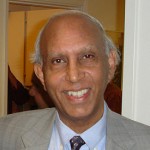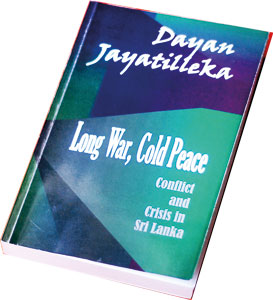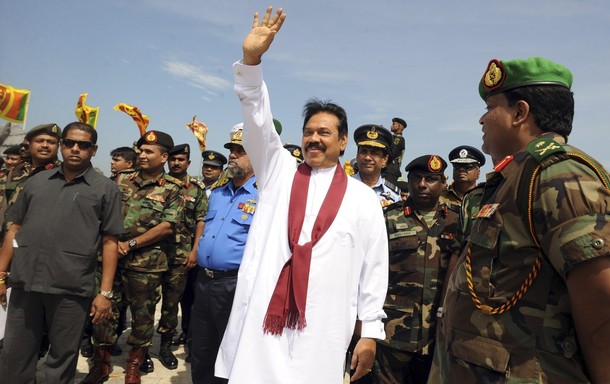–

Dr Ishtiaq Ahmed
The 30-year-old ethnic conflict in the Sri Lankan state, an essentially Sinhalese majoritarian preserve, and the uncompromising and relentlessly violent Tamil leadership claiming a separate state, Tamil Eelam, on behalf of the Tamil minority of north and east Sri Lanka, culminated with a comprehensive military defeat of the Tamil Tigers at the hands of the Sri Lankan military and paramilitary forces. However, it also turned out to be a terrible example of collective punishment for the Tamil minority. This is the tragedy that the political scientist, former political activist with a strong Marxist-humanist commitment and a Sri Lankan diplomat, who till recently was serving the UN in Geneva and France and UNESCO, analyses with courage and insight.
After the British transferred power in 1948 virtually without a freedom struggle being waged against them, the ruling elite, Sinhalese and Tamil, initially adhered to the pluralist model bequeathed by the British based on liberal constitutionalism. However, that did not last long and Sinhala ethno-nationalists, lay and clerical, began to assert a majoritarian Sinhalese-Buddhist identity and ideology that sought to marginalise the Tamils. The adoption of the Sinhala only bill in 1956 as the sole national language literally rendered the hitherto more advanced Tamil intelligentsia illiterate.
The moderate Tamil leadership failed to dissuade the majoritarian Sinhalese nationalists to accommodate the legitimate interests and concerns of their group. As a result, disappointment, frustration and despondency spread among the Tamils. The leadership then passed into the hands of extremists, and the Tamil Tigers, led by Velupillai Prabhakaran, emerged in 1976 as the most uncompromising and ruthless protagonists of Tamil separatism and secessionism.

Book Review: Long War, Cold Peace: Conflict and Crisis in Sri Lanka Author: Dayan Jayatilleka Publisher: Vijitha Yapa Publications, Columbo; 2013
Jayatilleka convincingly demonstrates that in the armed conflict that ensued, exclusive ultra-nationalism took up uncompromising positions on both sides. However, whilst the Tigers never relented, the Sri Lankan government on a number of occasions sought a compromise granting autonomy/devolution within a formally unitary state. He especially regards President Ranasinghe Premadasa as the leader who was most forthcoming to accommodate Tamil concerns including those related to the national language. He was pitilessly assassinated by the Tamil Tigers, who rejected all such overtures as their goal was to create a sovereign and independent Tamil Eelam. The Tigers also assassinated Indian Prime Minister Rajiv Gandhi and several Sri Lankan ministers and politicians including Tamils.
The author is at his masterly best when he applies his vast theoretical and conceptual knowledge, including normative political theory, to distinguish a freedom fighter from a terrorist. He defines terrorism as deliberate policy to target innocent civilians. In this regard, the review of Marxist theory and practice associated with Fidel Castro and Che Guevara is especially instructive, because although they resorted to armed struggle they considered it a necessary evil. Prabhakaran made a virtue out of violence and terror and personified that cult.
He reveals the psycho-ideological mindset of Prabhakaran as intrinsically fascistic. We learn that the leader of the Tigers actually hero-worshipped Hitler and kept a copy of Mein Kampf by his side, and like his hero extracted complete submission from his followers to his whim and caprice. Moreover, the Tamil Tigers showed no mercy to dissidents within the party or the opposition within Tamil society, or to innocent Muslims and Sinhalese. Their record of carrying out assassination attempts and suicide bombing predates by many years similar trends in South Asia.
Jayatilleka rejects the right of national self-determination to mean an absolute and automatic right to secede through the use of force and terrorism from an existing state. He asserts that secession from an existing state is not to be confused with liberation from colonial rule. Such an interpretation is an accurate understanding of the norms upheld by international law.
The author then examines the right of the state to wage war against an intransigent terrorist group in the light of classic just war doctrine and concludes that the Sri Lankan state had no other choice but to wage a war against the Tamil Tigers. It did so, but with such overwhelming force and ruthlessness that hapless non-combatant Tamils wholesale became its victims. It shocked the world and the United Nations expressed its concerns in no uncertain terms.
The author warns that a triumphant, vindictive, majoritarian Sinhalese mindset cannot win the peace. It is important to heal wounds and win back an estranged, defeated and humiliated minority. Currently a cold peace prevails that isolates and alienates the Tamil minority. He pleads for a just peace, which guarantees substantial autonomy, economic, political and cultural, equal rights for all citizens, and respect and acceptance of ethnic identity. To the Tamils his recommendation is to abandon secessionism and seek fair and equitable treatment within a pluralist, decentralised but unitary Sri Lanka integrated in a power-sharing framework. He argues that neither neo-liberal capitalism nor neoliberal conservatism can serve as the basis for building peace, which he argues has three important dimensions: the North-South axis; the rich-poor axis; and the country-world axis.
In my book, State, Nation and Ethnicity in Contemporary South Asia, London and New York: Pinter, 1996; 1998, I propounded a theory to analyse within a comparative framework a number of separatist movements in South Asia: Khalistani and Kashmiri in India; Sindhi and Mohajir in Pakistan; Chakma Hill Tribes in Bangladesh; and Tamils in Sri Lanka. I predicted that secession was doomed. The modern state is too well-armed vis-à-vis separatists. Moreover, international law and praxis is biased heavily in favour of the integrity of the state. Only when powerful neighbours or global powers support a challenger to the state can the balance of power possibly be tilted in favour of secessionism (pages 69-76). In the final showdown neither India nor any global power backed the Tamil Tigers: their extermination became inevitable. Seventeen years later Jayatilleka’s authoritative case study on Sri Lanka verifies the soundness and relevance of that theory.
*The reviewer is a PhD (Stockholm University); Professor Emeritus of Political Science, Stockholm University; and Honorary Senior Fellow, Institute of South Asian Studies, National University of Singapore. Latest publications: Pakistan: The Garrison State, Origins, Evolution, Consequences (1947-2011), Karachi: Oxford Unversity Press, 2013; The Punjab Bloodied, Partitioned and Cleansed: Unravelling the 1947 Tragedy through Secret British Reports and First-Person Accounts (Karachi: Oxford University Press, 2012; New Delhi: Rupa Books, 2011). He can be reached at [email protected]


